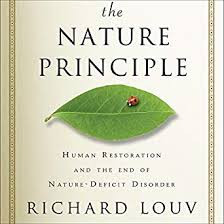
Take It Outdoors
As the 2018-19 school year comes to a close and we prepare for a nice summer break, I start to look forward to the time to recharge the batteries by getting back in touch with nature. Connecting with the natural world has many health benefits for all of us; socially, emotionally, physically and mentally. Researchers like American journalist Richard Louv have investigated the relationship of humans with the natural world and has found some very important connections.

Based on the research by Louv, many children and adults suffer from what he calls “nature-deficit disorder”— the idea that human beings, especially children, are spending less time outdoors, and the belief that this change results in a wide range of behavioral problems. Louv’s 2011 book, “The Nature Principle: Reconnecting with Life in a Virtual Age,” extended the conversation to include adults, and explored this key question: “What could our lives and our children’s lives be like if our days and nights were as immersed in nature as they are in technology?”
The natural world’s benefits to our condition and health will be irrelevant if we continue to destroy the nature around us. But that destruction is assured without a human reconnection to nature.
Parental fears, restricted access to natural areas, and the lure of technological devices have contributed greatly to this phenomenon. This means we are missing out on the benefits that nature brings to our lives. Many research studies have been conducted and found similar findings to Louv’s writing. I would like to share a few of them with you:
Nature heals
Pennsylvania researchers found that patients in rooms with tree views had shorter hospitalisations, less need for pain medications and fewer negative comments in the nurses’ notes, compared to patients with views of brick.
Nature can reduce depression and improve psychological well being
Researchers in Sweden have found joggers who exercise in a natural green setting feel more restored and less anxious, angry, or depressed than people who burn the same amount of calories jogging in a built urban setting.
Nature builds community bonds
Researchers at the University of Rochester report that exposure to the natural environment leads people to nurture close relationships with fellow human beings, value community, and to be more generous.
The more high-tech our lives become, the more nature we need
We have a human right to a meaningful connection to nature, and we have the responsibilities that come with that right. Many people today support the notion that every person, especially every young person, has a right to access the internet. How much more should every person have a right to access the natural world, because that connection is part of our humanity?
Children no longer have the opportunity to play freely in nature, exploring woods or wading in a stream, and there are fewer natural areas that are accessible.
So what is the larger picture impact of fewer connections with nature? The natural world’s benefits to our cognition and health will be irrelevant if we continue to destroy the nature around us, but that destruction is assured without a human reconnection to nature. We must make sure the next generation also has the opportunity to have meaningful encounters with nature, because they cannot grow to love nature if they do not experience it. If children lose their love of nature, who will be the environmental stewards of the future?
To conclude, there are so many ways for us to take it outside and enjoy the outdoors; from simple walks to playing games to hiking and camping. And the best part is we are being healthy while having fun. As you wrap up the busy school year, I wish all of you a restful and rejuvenating summer break with many positive interactions with nature, wherever you go in the world.



